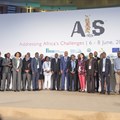African innovation must be nurtured

The Africa Innovation Summit (AIS) closed on Friday with a resonating call to action addressed to innovators, government leaders, private sector, civil society and academia: “Let us throw out the boxes that have caged us”.
The overwhelming view of the Summit was that in order to nurture, empower and propel African innovators and their solutions forward, a multi-sectorial and multi-stakeholder approach must be taken to ensure policies, investments and enabling ecosystems are put in place to support African innovation without apology or hesitation.
Some of the Summit’s themes, which were explored in action-oriented workshops from 6-8 June 2018, included the following:
- Gender and building innovation ecosystems in Africa.
- Civil society and NGO’s and innovation.
- Meeting the basics: water-energy-food nexus.
- The future of health care and societal wellbeing.
- The future of peace and justice.
- Blockchain: Applications to development finance.
- ‘Jobs and Value’ in the Age of Automation and demographic shifts.
- Innovation Lab: Innovating into a low(er) carbon African future.
- African Cities: Meeting basic needs and ensuring balance.
- Mobilising domestic resources to fund innovation.
Obiageli Ezekwesili, former vice president for Africa at the World Bank, shared her view: “If Africa accepted that people have to be at the centre, then we would be confronted with the fact that Africa’s people problem is a productivity problem. And this productivity problem is an innovation issue. We need an upheaval and people in government who can overturn the old way of doing things.”
Speaking about the role of government, Carlos Lopes, former executive secretary of the United Nations Economic Commission for Africa (UNECA), said: “It is not a question of knowing what is right but doing what is right. We need to be tough with our leaders. It is a pre-condition for change.
“We have a wave of transformation in Africa. There is political will to translate Africa’s dreams into practical tools. We need to harness our negative energy and change it into dynamism.”
From 600 applications of the 44 countries, a selected group of 50 innovators had a unique opportunity to engage stakeholders in discussing potential solutions to some of the blockages that are preventing solutions from going to scale.
We have a wave of transformation in Africa. There is political will to translate Africa’s dreams into practical tools.
Scarr said that the biggest challenges he encountered as an innovator was being able to “overcome fear and getting it done”, adding that it is not always about the lack of financial resources but more about “finding the time to do it and getting into the right mind-set”.
Francis Nderitu Mwangi, top 50 innovator with his solution, Vakava Quickgold, which provides unbreakable cold chains in agriculture from post-harvest to the last mile by storing cold energy in dry ice batteries that do not need to rely on any external power sources, outlined one of the challenges innovators face in Africa: “I feel like there’s some sort of discrimination towards the local innovators. Our own African investors tend to invest in foreign innovations. There are also infrastructure issues, as rural Africa does not have good connectivity and is therefore not able to receive our network.”
AIS 2018 focused on innovative and disruptive solutions to the major challenges facing African countries, which include energy access, water, food insecurity, health systems, and governance. As a platform for multi-stakeholder dialogue and actions, AIS is Africa’s only summit on innovation that seeks to foster action-driven dialogue between African innovators and stakeholders in Government, private sector, civil society and academia to ensure African solutions are concretely given the opportunity to scale in a measurable way.
Community of innovators
The summit has also created a community of innovators that will not only meet to dialogue on solutions but also create ecosystems that will enable them to share ideas and network beyond the summit.
In his final call to action, Dr Olugbenga Adesida, co-director of AIS, called for a bolder imagination about the future by Africans and a sense of urgency around Africa’s transformation. He noted that innovation is a pre-requisite for Africa’s transformation and that all stakeholders must engage to facilitate greater collaboration.
“Africa must ensure greater self-reliance by mobilising domestic funding to promote innovation and support our innovators, The future belongs to them. We must build robust ecosystems for innovation in our respective countries on the continent. Africa cannot simply be consumers, nor can it outsource its development. We all must engage with a new sense of urgency to facilitate change!”
The presence of the Top 50 African Innovators in Kigali was made possible by the sponsorship of the European Union Commission. Other key partners and sponsors included the Government of Rwanda, the Rockefeller Foundation, the Government of Luxemburg, NEPAD Agency, the African Development Bank (AfDB), the Development Bank of Southern Africa (DBSA), Afreximbank, the Swedish International Development Agency (SIDA), YAS (UNDP & Accenture), Usawa.io, BADEA, PATH, International IDEA, OIF Ethiopia Airlines and Turkish Airlines.
Source: African Press Organisation

APO is the sole press release wire in Africa, and the global leader in media relations related to Africa. With headquarters in Dakar, Senegal, APO owns a media database of over 150,000 contacts and the main Africa-related news online community.
Go to: www.bizcommunity.com/PressOffice.aspx?cn=apogroup
























